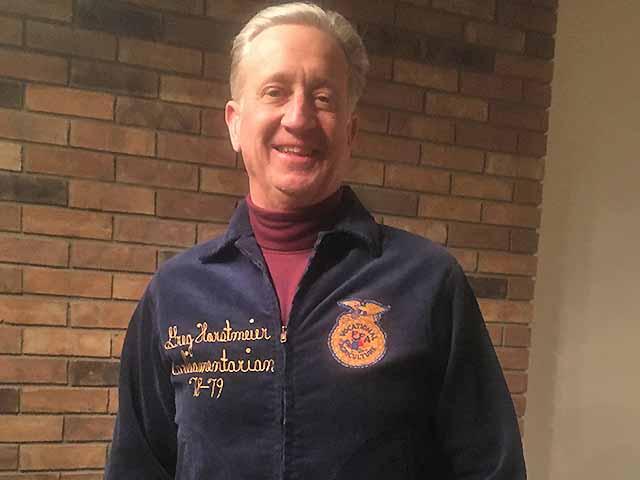Grassley Wants Northey Approved
Senator Says Infrastructure May Take Center Stage in 2018
OMAHA (DTN) -- Sen. Charles Grassley, R-Iowa, said Tuesday the U.S. Senate needs to end a hold on the nomination of Iowa Agriculture Secretary Bill Northey to a key USDA post and also pushed ethanol and oil interests to work out their differences with the Renewable Fuel Standard.
Grassley told reporters he hasn't talked with Sen. Ted Cruz, R-Texas, about the continued hold up of Northey's nomination to USDA undersecretary.
Cruz placed the hold until lawmakers from oil-producing states were granted a meeting with the president and others to discuss possible changes to the RFS.
Cruz and others have proposed placing a 10-cent cap on the price of renewable identification numbers, or RINs, as a way to bring down RFS compliance costs for refiners.
Grassley said he is calling for representatives from both the oil and ethanol industries to hold meetings about possible RFS solutions. Northey's nomination "will have to proceed without the RFS," Grassley said. "Northey is entitled to an answer as to when he's dealt with in the United States Senate."
Grassley said the ethanol industry "tells us a cap on RINs would be catastrophic to ethanol. This is a pretty unanimous feeling among the ethanol industry that it would be a no-go. There seems to be some lack of communication on the impact on these various proposals would have."
Cruz offered the proposal on behalf of oil refiners. In response, biofuel industry leaders sent a letter to the president in recent weeks with details on why the RIN market exists, how it is operated by the U.S. Environmental Protection Agency, and some of the problems the agency has in providing transparency on RIN trading.
RINs are generated when a qualified renewable fuel is either produced or imported. RINs then are bought within the refinery industry by companies that are not producing or buying enough renewable fuels to meet their blending obligations.
There are several nested categories for RINs depending upon the renewable -- such as corn ethanol or biodiesel -- which do have different values. D6 is considered the baseline RIN.
P[L1] D[0x0] M[300x250] OOP[F] ADUNIT[] T[]
The Cruz proposal is for the EPA to sell a 10-cent, fixed-price waiver credit that would qualify as a RIN and satisfy a petroleum blender's obligations. The proceeds from the 10-cent waiver sales would help pay for renewable-fuel blending infrastructure, tied to an existing program such as the Biofuel Infrastructure Partnership or a similar fund.
The senator also proposed the establishment of a working group, including administration officials, to find a long-term solution to the RIN issue.
INFRASTRUCTURE WORK
Though it remains to be seen, improving infrastructure may be one of the major legislative issues tackled by President Donald Trump's administration and Congress in 2018.
Even if that never happens, a group of United States senators including Grassley want the administration to maintain a certain level of funding for lock-and-dam infrastructure in 2019.
Grassley said the debate on the future of infrastructure funding will center on whether improvements can get across the finish line using a mix of public and private funds.
"That's going to be a very major issue," he said. "Democrats would like to see it all public financed."
Grassley said he expects the first $200 billion in infrastructure will be publicly financed.
If a $1 trillion, multi-year infrastructure bill comes to fruition, Grassley said, funding likely would have to come from either tax increases or savings from other federal spending programs.
"There hasn't been a source of funding by anybody at this point," he said, noting that funding through private-public partnerships might not work in rural America.
The recent tax bill signed into law dropped the corporate tax rate from about 35% to 21%. Grassley said while this means companies will repatriate money parked overseas back into the United States, it's "not designated for infrastructure, it's just going into the public treasury. We need to come up with a brand new source of revenue," he said.
In a letter to Mick Mulvaney, director of the Office of Budget and Management, Grassley and fellow senators Tammy Baldwin, D-Wis.; Roy Blunt, R-Mo.; Bill Cassidy, R-La.; John Kennedy, R-La.; Tammy Duckworth, D-Ill.; Richard Durbin, D-Ill.; Claire McCaskill, D-Mo.; Roger Wicker, R-Miss.; and Amy Klobuchar, D-Minn., asked the OMB to continue to fund the Navigation and Ecosystem Sustainability Program in fiscal year 2019, as well as the U.S. Army Corps of Engineers' 2018 work plan.
In the letter, the senators said that with "appropriate funding," many of the construction projects on the nation's inland navigation system could be ready for construction within a year.
"Our inland waterways are key to U.S. competitiveness in the global economy," the letter said.
"With the expansion of the world food and energy needs, the Mississippi River is poised to be more important than ever. The river already moves large volumes of agricultural and energy products between U.S. markets and ports, and serves as the country's busiest waterway. However, the overwhelming majority of UMRS infrastructure was constructed in the 1930s and has exceeded its design life by decades, causing closure and limiting overall capacity. Improvements are necessary."
Read the letter here: http://bit.ly/…
Todd Neeley can be reached at todd.neeley@dtn.com
Follow him on Twitter @toddneeleyDTN
(AG/ES)
Copyright 2018 DTN/The Progressive Farmer. All rights reserved.



